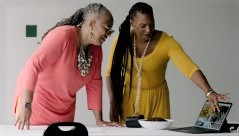AARP Hearing Center
According to the World Health Organization, some 80 million people in the world, or 1 percent of the population, need a wheelchair. Without mobility, many people are confined to their homes, forced to crawl or be carried. Since 2001, Free Wheelchair Mission and our partners have distributed almost 1.4 million wheelchairs, at no cost, to people living with disabilities in 94 developing countries around the world.
The problem I’m trying to solve
Having a family member with a disability that prevents them from walking affects the entire family: People in developing countries may have to give up jobs to take care of someone fulltime, for instance. Just getting a person with a disability to the bathroom takes effort, and you end up doing a lot more laundry, and it might be down at the river. We see parents who hurt their backs carrying their child, until the day comes when they have to say, “Son, I can’t carry you anymore. This is the end of your education.” Wheelchairs not only transform the lives of individual users, but also the lives of their caregivers, families and communities. With a wheelchair, recipients can go to school, to work and to church, see family again or just get out and feel the sunshine.
The moment that sparked my passion
In 1979, my wife and I took a vacation to Morocco. Within six hours of arriving, we were in a small town, where we saw a woman digging her fingernails into the dirt to drag herself along. She had torn clothes and open cuts on her legs. People were stepping over her like she was not there. Gradually, she got across the road and disappeared down an alley. We said, “We have to do something!” But what? We went home and I pushed that image out of my brain, but every now and then it came up again. It wasn’t for 20 more years — during which time I was brought to my knees through a series of family issues, my start-up shutting down, encouragement from people at my church and support from my wife — that I built 100 wheelchairs in my garage. I took four on a mission trip to India, where I gave the very first to a boy in a village. He and his family’s whole outlook changed in seconds. I swear his parents were taller, with the weight of worry off their shoulders. Since then, I’ve seen this over and over: People who suddenly have hope. To go from living your life on the ground, being cared for by other people, to suddenly receiving freedom of movement — it’s a life changer.






































































More About AARP's Purpose Prize
Learn about previous winners and fellows
AARP's Purpose Prize FAQ
Read the official rules, eligibility, odds and prize disclosures